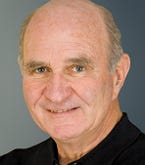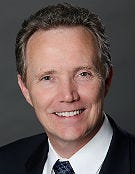Sandler Partners SoCal Summit: TPx Considering Potential M&A
Meantime, Sandler Partners stressed the importance of its relationship with a wireless giant.


James Anderson
(pictured above: Seated are TPx’s Dick Jalkut (left) and AT&T’s Kevin Leonard.)
**Editor’s Note: Please click here for a recap of the biggest channel-impacting merger and acquisition news from August.**
SANDLER PARTNERS SOCAL SUMMIT — TPx Communications says it is eyeing potential acquisitions as it expands its breadth of services and the areas it serves.
TPx’s Dick Jalkut, president and chief officer, described the company’s evolution from a regional CLEC on the West Coast to a national managed services carrier at the Sandler Partners SoCal Summit on Wednesday.

TPx’s Dick Jalkut
The company’s 2016 acquisition of East Coast-based DSCI signaled a major change for the company, which later rebranded itself from TelePacific. TPx then had to decide how it would expand its footprint, and if its direct or indirect sales would lead the way. That’s when the company hired Jim Delis, a Time Warner Cable and XO Communications channel veteran, to build its partner strategy.
“We decided not to build our direct sales force across the country. We kept our direct sales forces where they were, but in the last three or four months, we added channel managers in Chicago, Pittsburgh, Philadelphia, Washington, D.C., Orlando, Florida. — you get the idea,” Jalkut told the audience of Sandler Partners agents.
The company on Tuesday promoted Carl Moore to director of national channel development for the East Coast and now has 24 channel managers.
When asked if TPx will stop selling circuits, Jalkut said it will continue that practice in certain circumstances. The company’s sales force identifies if a customer needs a bandwidth solution to determine if a tethered network or an over-the-top capability is necessary.
“We have a huge investment that we’ve made in California, Nevada and Texas and on the East Coast with tethered networks,” Jalkut said. “So we’re very interested in being a managed services carrier – not just a managed services provider – and we like to make that distinction.”
Jalkut also answered a question about whether TPx is looking to make a ninth acquisition. He said “yes” and clarified that he wants to avoid “overloading on acquisitions,” causing confusion among his employees.
“We’ve done it successfully eight times; we’re now doing it successfully for the ninth time (DSCI). There are a lot of synergies that have to be realized as a result of that. Obviously, integrating the brands is very important. We’ve probably got another year of effort in order to finish that project, and we’ve identified about 10-12 companies across the country – most of them in the IT space – that we think would be very complementary to what it is we’re doing. We would add different geographies, would add different capabilities, different skill sets, different talent and more entrepreneurship if we make those acquisitions,” he said.
Jalkut was on stage with Kevin Leonard, vice president of alternate channels for AT&T, who spoke about the evolution that AT&T’s Alliance Channel has made. Leonard said his program has made significant steps in driving …
… mobility, to the point where more than 75 percent of partners sell integrated solutions.

AT&T’s Kevin Leonard
“Eight years ago, there was zero production coming out of our channel with mobility. But we introduced it. We said it’s becoming a mobile world. Virtualization is one of the key tenets that’s going to lead us going forward,” he said.
Leonard spoke to Channel Partners about how changes within AT&T Partner Solutions will affect the Alliance Channel. AT&T’s three indirect sales programs – Alliance Channel, Partner Exchange and ACC Business – will now all be under the umbrella of AT&T Partner Solutions. The restructuring means that the programs can benefit from each other more. For example, Leonard says he looks forward to using some of AT&T Partner Exchange’s enablement tools.
“The reality of it is, each of those thee programs fits different pieces of the market. The market is huge out there, and it made sense to bring it together, not to say, ‘Let’s make it one program.’ That’s not the issue here. It is to maximize the best of all of them so that we can leverage all of the programs tremendously,” Leonard said.
Alan Sandler, the founder of Sandler Partners, told Channel Partners that AT&T as a whole has made an effort to drive channel efforts. AT&T Alliance Channel added Sandler Partners to a pilot this summer.
“They’re trying really hard internally,” Sandler said. “And management’s starting to realize this over the last few years under the leadership of Kevin Leonard, that there is an incredible value from the indirect channel, from the agents. So now they’re trying to make it easier for the agents to do business. While they haven’t achieved perfection, they have moved in the right direction.”
Sandler welcomed agents to the one-day summit on Wednesday and closed the event as well. He tells Channel Partners that his partners have shown a strong uptake in hosted UCaaS, cloud computing, cybersecurity and software-defined wide area networking (SD-WAN). They’re also speaking to more departments in a business and not just IT managers.
“What we were really wanting to get out of this event is to help the continuation of what we’ve seen in the past few years, of our partners transitioning from just selling commodity bandwidth to selling VoIP to selling SD-WAN,” he said. “That’s all happened over the past few years, and it’s slowly helped to make the partners more valuable to their customers.”
Read more about:
AgentsAbout the Author
You May Also Like


